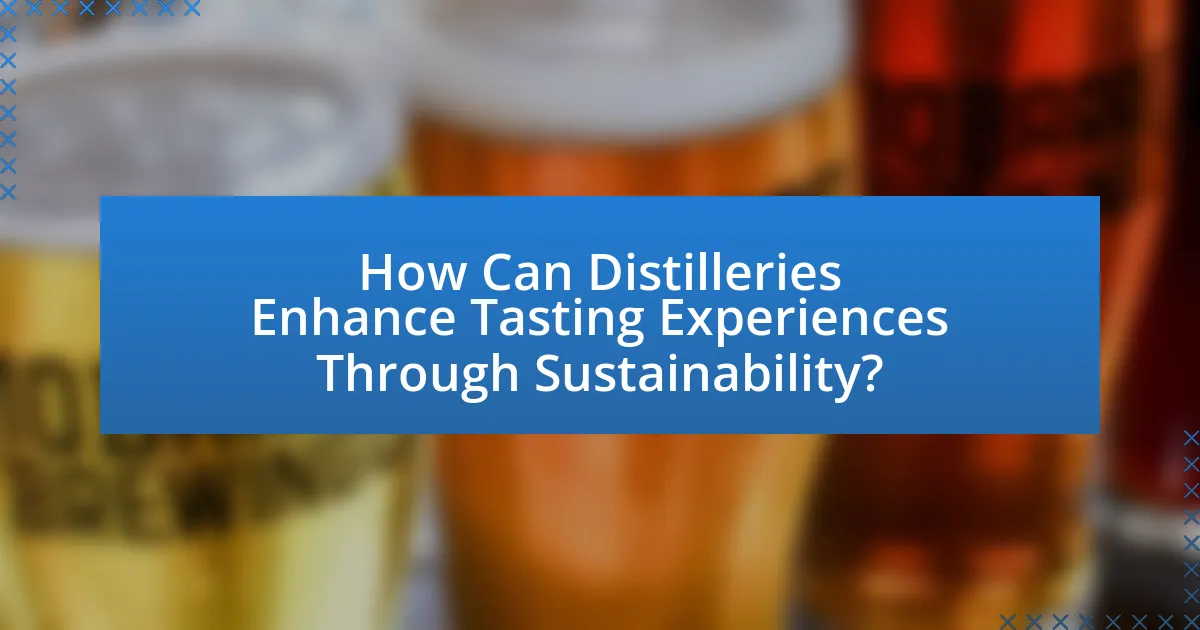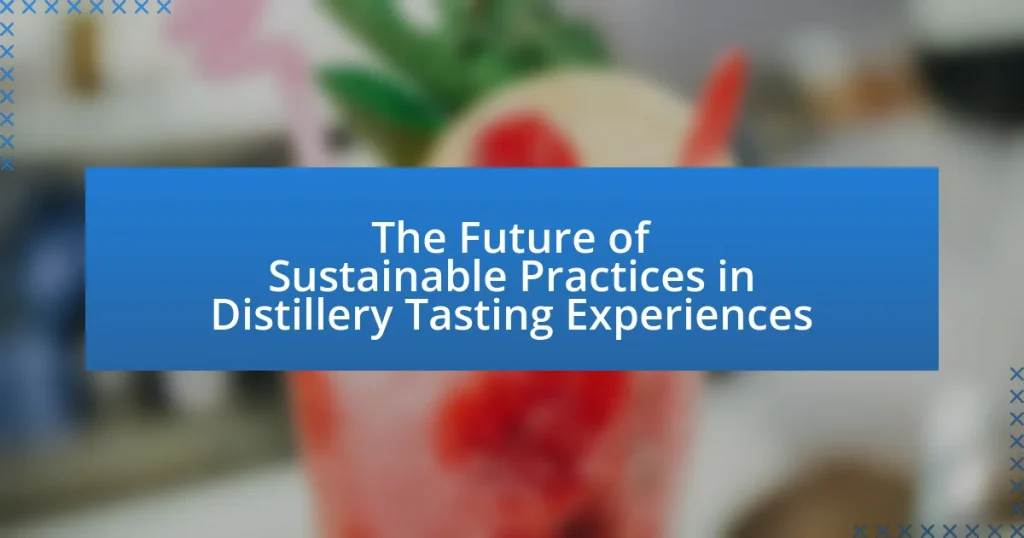The article focuses on sustainable practices in distillery tasting experiences, highlighting the importance of using locally sourced ingredients, waste reduction strategies, and eco-friendly transportation options. It discusses how these practices not only reduce environmental impact but also enhance the quality of spirits and align with consumer preferences for sustainability. Key components of sustainability in distilling, such as resource efficiency and responsible sourcing, are examined, along with the innovations driving future practices in the industry. The article also addresses the challenges distilleries face in implementing these practices and offers practical tips for creating sustainable tasting experiences.

What are Sustainable Practices in Distillery Tasting Experiences?
Sustainable practices in distillery tasting experiences include using locally sourced ingredients, implementing waste reduction strategies, and promoting eco-friendly transportation options for visitors. By sourcing ingredients from nearby farms, distilleries reduce their carbon footprint and support local economies. Waste reduction strategies, such as composting and recycling, minimize environmental impact and enhance sustainability. Additionally, offering incentives for visitors to use public transport or carpool can further decrease emissions associated with travel to the distillery. These practices not only contribute to environmental conservation but also align with consumer preferences for sustainability, as evidenced by a 2021 survey indicating that 73% of consumers prefer brands that demonstrate environmental responsibility.
How do sustainable practices impact the distillery industry?
Sustainable practices significantly enhance the distillery industry by reducing environmental impact and improving operational efficiency. Distilleries that adopt sustainable methods, such as utilizing renewable energy sources and implementing water conservation techniques, can lower their carbon footprint and resource consumption. For instance, a study by the Distilled Spirits Council reported that distilleries employing sustainable practices can reduce energy usage by up to 30%, leading to substantial cost savings and a positive brand image. Additionally, sustainable sourcing of raw materials, like organic grains, not only supports local agriculture but also appeals to environmentally conscious consumers, thereby increasing market competitiveness.
What are the key components of sustainability in distilling?
The key components of sustainability in distilling include resource efficiency, waste reduction, and responsible sourcing. Resource efficiency involves optimizing energy and water usage during the distillation process, which can significantly lower the environmental impact; for instance, using renewable energy sources can reduce carbon emissions. Waste reduction focuses on minimizing by-products and utilizing them effectively, such as repurposing spent grains for animal feed or composting. Responsible sourcing emphasizes the use of locally sourced ingredients, which supports local economies and reduces transportation emissions. These components collectively contribute to a more sustainable distilling practice, aligning with the growing demand for environmentally conscious production methods in the beverage industry.
How do these components enhance the tasting experience?
Sustainable components enhance the tasting experience by providing a more authentic and environmentally conscious interaction with the product. These components, such as locally sourced ingredients and eco-friendly production methods, contribute to a unique flavor profile that reflects the terroir, or the environmental conditions of the region. For instance, studies have shown that spirits made from local grains exhibit distinct characteristics that resonate with the local culture and climate, thereby enriching the tasting experience. Additionally, sustainable practices often involve transparency in production, which fosters a deeper connection between the consumer and the distillery, enhancing appreciation for the craftsmanship involved.
Why is sustainability important for distillery tasting experiences?
Sustainability is important for distillery tasting experiences because it enhances the quality of products while minimizing environmental impact. Distilleries that adopt sustainable practices, such as sourcing local ingredients and utilizing eco-friendly production methods, create spirits that reflect a commitment to environmental stewardship. For instance, a study by the Distilled Spirits Council indicates that sustainable practices can lead to a 20% reduction in carbon emissions during production. This not only appeals to environmentally conscious consumers but also fosters a deeper connection between the distillery and its patrons, as visitors increasingly seek experiences that align with their values.
What environmental benefits arise from sustainable distilling?
Sustainable distilling offers significant environmental benefits, including reduced carbon emissions, efficient water usage, and minimized waste production. By utilizing renewable energy sources, such as solar or wind power, distilleries can lower their carbon footprint, contributing to climate change mitigation. Additionally, sustainable practices often involve water recycling and conservation techniques, which help preserve local water resources. Furthermore, sustainable distilling emphasizes the use of by-products, such as repurposing spent grains for animal feed, thereby reducing overall waste and promoting a circular economy. These practices not only enhance environmental sustainability but also align with growing consumer demand for eco-friendly products.
How does sustainability influence consumer preferences?
Sustainability significantly influences consumer preferences by driving demand for environmentally friendly products and practices. Consumers increasingly prioritize brands that demonstrate a commitment to sustainability, as evidenced by a 2021 Nielsen report indicating that 73% of global consumers are willing to change their consumption habits to reduce environmental impact. This shift is particularly evident in industries like food and beverage, where sustainable sourcing and production methods enhance brand loyalty and attract eco-conscious customers. Furthermore, research from the Harvard Business Review shows that companies with strong sustainability practices often outperform their competitors in terms of sales growth and customer satisfaction, reinforcing the importance of sustainability in shaping consumer choices.

What Innovations are Shaping the Future of Sustainable Distillery Practices?
Innovations shaping the future of sustainable distillery practices include the adoption of renewable energy sources, water conservation technologies, and waste reduction strategies. Distilleries are increasingly utilizing solar and wind energy to power their operations, significantly reducing their carbon footprint. For instance, a study by the Distilled Spirits Council reported that distilleries using renewable energy can cut greenhouse gas emissions by up to 80%. Additionally, advanced water recycling systems are being implemented to minimize water usage, with some distilleries achieving a reduction of over 50% in water consumption. Furthermore, the integration of circular economy principles allows distilleries to repurpose by-products, such as using spent grains for animal feed or bioenergy, thereby reducing waste and enhancing sustainability. These innovations collectively contribute to a more environmentally responsible distillation process.
How are technology and innovation driving sustainability in distilleries?
Technology and innovation are driving sustainability in distilleries by enabling more efficient resource management and reducing waste. For instance, advanced distillation techniques, such as continuous distillation and energy recovery systems, minimize energy consumption and water usage, leading to a lower environmental footprint. Additionally, innovations like bioreactors and fermentation optimization allow distilleries to utilize by-products, transforming waste into valuable resources, which enhances overall sustainability. According to a report by the Distilled Spirits Council, implementing these technologies can reduce water usage by up to 50% and energy consumption by 30%, demonstrating their effectiveness in promoting sustainable practices within the industry.
What role does renewable energy play in distillery operations?
Renewable energy plays a crucial role in distillery operations by reducing carbon emissions and lowering energy costs. Distilleries increasingly utilize solar, wind, and biomass energy sources to power their processes, which not only enhances sustainability but also aligns with consumer demand for environmentally responsible practices. For instance, a study by the Distilled Spirits Council indicates that distilleries adopting renewable energy can cut greenhouse gas emissions by up to 50%, demonstrating a significant impact on environmental sustainability.
How can waste reduction techniques improve sustainability?
Waste reduction techniques can significantly improve sustainability by minimizing resource consumption and reducing environmental impact. Implementing practices such as recycling, composting, and efficient inventory management decreases the amount of waste sent to landfills, which in turn lowers greenhouse gas emissions. For instance, a study by the Environmental Protection Agency indicates that recycling and composting prevented the release of approximately 186 million metric tons of carbon dioxide equivalent into the air in 2013 alone. By adopting these techniques, distilleries can enhance their operational efficiency, conserve natural resources, and contribute to a more sustainable future.
What are some examples of successful sustainable distilleries?
Some examples of successful sustainable distilleries include Benromach Distillery, which uses organic barley and renewable energy sources, and The Glenlivet, known for its water conservation efforts and sustainable packaging. These distilleries have implemented practices that reduce their environmental impact, such as utilizing local resources and minimizing waste. Benromach’s commitment to organic production and The Glenlivet’s focus on sustainability have earned them recognition in the industry, showcasing effective models for environmentally responsible distilling.
How have these distilleries implemented sustainable practices?
Distilleries have implemented sustainable practices by adopting renewable energy sources, optimizing water usage, and utilizing waste materials for energy or other products. For instance, many distilleries have installed solar panels to power their operations, significantly reducing their carbon footprint. Additionally, they have implemented water recycling systems to minimize consumption, with some reporting reductions in water usage by up to 50%. Furthermore, distilleries often repurpose byproducts, such as using spent grains for animal feed or converting them into bioenergy, thereby enhancing resource efficiency and reducing waste. These practices not only contribute to environmental sustainability but also improve operational efficiency and cost-effectiveness.
What lessons can be learned from their experiences?
Lessons learned from the experiences in sustainable practices within distillery tasting experiences include the importance of integrating eco-friendly methods and community engagement. Distilleries that adopted sustainable sourcing of ingredients, such as local grains and organic botanicals, demonstrated reduced environmental impact and enhanced product quality. For instance, a study by the Distilled Spirits Council highlighted that distilleries implementing water conservation techniques reduced their water usage by up to 30%, showcasing the effectiveness of sustainable practices. Additionally, engaging local communities in the production process not only fosters goodwill but also supports local economies, as evidenced by distilleries that have seen increased customer loyalty and brand recognition through community involvement initiatives.

How Can Distilleries Enhance Tasting Experiences Through Sustainability?
Distilleries can enhance tasting experiences through sustainability by implementing eco-friendly practices that improve product quality and consumer engagement. For instance, using organic ingredients not only reduces chemical exposure but also often results in richer flavors, as seen in distilleries that prioritize local sourcing, which can enhance the freshness and uniqueness of their spirits. Additionally, sustainable packaging, such as biodegradable or recyclable materials, can create a more appealing presentation while minimizing environmental impact. Research indicates that consumers are increasingly drawn to brands that demonstrate environmental responsibility, with a Nielsen report showing that 66% of global consumers are willing to pay more for sustainable brands. This alignment between sustainability and consumer preferences can lead to a more memorable tasting experience, as patrons feel a connection to the values of the distillery.
What strategies can distilleries adopt to promote sustainable tasting experiences?
Distilleries can promote sustainable tasting experiences by implementing eco-friendly practices such as sourcing local ingredients, utilizing renewable energy, and minimizing waste. Sourcing local ingredients reduces transportation emissions and supports local agriculture, while using renewable energy sources, like solar or wind, decreases the carbon footprint of production. Additionally, distilleries can adopt waste reduction strategies, such as recycling and composting, to ensure that by-products are repurposed effectively. For instance, a study by the Distilled Spirits Council indicates that distilleries that engage in sustainable practices can enhance their brand image and attract environmentally conscious consumers, demonstrating the market viability of these strategies.
How can local sourcing of ingredients enhance sustainability?
Local sourcing of ingredients enhances sustainability by reducing transportation emissions and supporting local economies. When ingredients are sourced from nearby farms or producers, the carbon footprint associated with long-distance shipping is significantly lowered, contributing to a decrease in greenhouse gas emissions. Additionally, local sourcing fosters community resilience by keeping money within the local economy, which can lead to more sustainable agricultural practices. Studies indicate that local food systems can reduce energy use by up to 50% compared to conventional supply chains, demonstrating the environmental benefits of this approach.
What role does education play in sustainable tasting experiences?
Education plays a crucial role in sustainable tasting experiences by equipping participants with knowledge about sustainable practices and the environmental impact of their choices. Through educational programs, individuals learn about the importance of sourcing ingredients responsibly, reducing waste, and supporting local economies, which enhances their appreciation for sustainable products. Research indicates that informed consumers are more likely to choose sustainable options; for instance, a study published in the Journal of Cleaner Production found that consumer awareness significantly influences purchasing decisions related to eco-friendly products. Thus, education fosters a deeper understanding of sustainability, ultimately leading to more responsible tasting experiences in distilleries.
What are the challenges faced by distilleries in implementing sustainable practices?
Distilleries face several challenges in implementing sustainable practices, primarily due to high initial costs, regulatory complexities, and supply chain limitations. High initial costs arise from the investment needed for sustainable technologies and infrastructure, which can deter smaller distilleries from adopting these practices. Regulatory complexities often involve navigating various environmental laws and standards that can vary by region, making compliance difficult. Additionally, supply chain limitations can hinder access to sustainable raw materials, as not all suppliers may offer eco-friendly options. These factors collectively impede the transition to more sustainable operations within the distillery industry.
How can distilleries overcome these challenges?
Distilleries can overcome challenges by implementing sustainable practices such as sourcing local ingredients, utilizing renewable energy, and adopting water conservation techniques. For instance, sourcing local grains reduces transportation emissions and supports local agriculture, while renewable energy sources like solar or wind power can significantly lower carbon footprints. Additionally, water conservation methods, such as recycling water used in production, can enhance sustainability. According to a 2021 report by the Distilled Spirits Council, distilleries that adopted these practices saw a 20% reduction in operational costs and improved brand loyalty among environmentally conscious consumers.
What support systems are available for distilleries pursuing sustainability?
Distilleries pursuing sustainability can access various support systems, including government grants, industry partnerships, and sustainability certification programs. Government grants, such as those offered by the U.S. Department of Agriculture, provide financial assistance for implementing eco-friendly practices. Industry partnerships, like those formed with organizations such as the Distilled Spirits Council, offer resources and networking opportunities to share best practices. Additionally, sustainability certification programs, such as the Certified Green program, help distilleries demonstrate their commitment to sustainable practices, enhancing their marketability and consumer trust. These support systems collectively enable distilleries to adopt and maintain sustainable practices effectively.
What practical tips can distilleries follow to create sustainable tasting experiences?
Distilleries can create sustainable tasting experiences by implementing eco-friendly practices such as sourcing local ingredients, minimizing waste, and utilizing renewable energy. Sourcing local ingredients reduces transportation emissions and supports local economies, while minimizing waste through practices like recycling and composting helps to lessen environmental impact. Additionally, using renewable energy sources, such as solar or wind power, can significantly decrease the carbon footprint of distillery operations. According to the Distilled Spirits Council, sustainable practices not only benefit the environment but can also enhance brand loyalty among consumers who prioritize sustainability.


